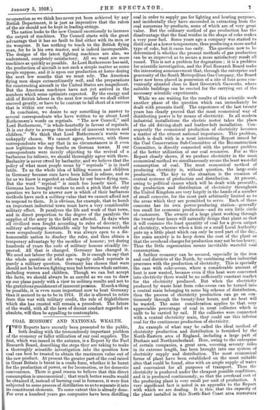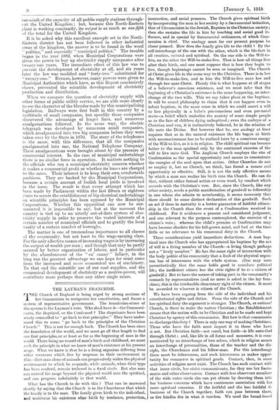COAL ECONOMY AND NATIONAL WEALTH. coal in order to supply
gas for lighting and heating purposes, and incidentally they have succeeded in extracting from the coal numerous by-products, some of which are of very great value. But the ordinary method of gas production has the disadvantage that the final residue in the shape of coke makes a very poor fuel. Some years ago a company was started to distil coal at a lower temperature, thus producing a more useful type of coke, but it came too early. The question now to be determined is whether the present methods of gas production can be so improved as to secure a more satisfactory result all round. This is not a problem for dogmatism ; it is a problem for scientific investigation, and the Fuel Research Board make the interesting announcement that, through the enterprise and generosity of the South Metropolitan Gas Company, the Board have now been placed in possession of a site of four acres con- veniently situated close to East Greenwich Gasworks, where suitable buildings can be erected for the carrying out of the necessary scientific experiments.
While we are waiting for the results of this scientific work another phase of the question which can immediately be dealt with presents itself. The experience of the last twenty years has clearly proved that the most economical way of distributing power is by means of electricity. In all modern industrial installations the electric motor takes the place of the old driving-shaft and leather-belt installation. Con- sequently the economical production of electricity becomes a matter of the utmost national importance. This problem, which is dealt with in a most interesting Report issued by the Coal Conservation Sub-Committee of the Reconstruction Committee, is directly connected with the primary problem of the better utilization of our coal resources. For as thi3 Report clearly shows, if we produce electricity in the most economical method we simultaneously secure the least wasteful consumption of coal. The most economical method of producing electricity is, without question, the large-scale production. The key to the situation is the creation of central systems of production and distribution. At present, owing to political causes which will be dealt with presently. the production and distribution of electricity throughout the United Kingdom are very largely in the hands of a number of small concerns, for the most part arbitrarily limited as to the areas which they are permitted to serve. Each of these concerns has its own power-producing station—generally too small for economic production—and its own little circle of customers. The owners of a large plant working through the twenty-four hours will naturally design that plant so that it will consume the least quantity of coal for a given output of electricity, whereas when a firm or a small Local Authority puts up a little plant which can only be used part of the day, the main anxiety is to keep down the cost of the plant so that the overhead charges for production may not be too heavy. Thus the little organization means inevitable wasteful coal consumption. A further economy can be secured, especially in the iron and coal districts of the North, by combining other industrial processes with the production of electricity. This is specially the case with coke-ovens, where a considerable amount of heat is now wasted, because even if this heat were converted into electricity there would be no sufficiently constant market for the electricity produced. But when the electricity produced by waste heat from coke-ovens can be turned into a central main belonging to some big scheme of distribution, then the process of electricity production can go on con- tinuously through the twenty-four hours, and no heat will be wasted. The same consideration applies to that very appreciable percentage of coal in most collieries which is unfit to be carried by rail. If the collieries were connected with a central electricity main, they could use this inferior coal for the continuous production of electricity.
An example of what may be called the ideal method of electricity production and distribution is furnished by the North-Eastern area of England, including a large part of Durham and Northumberland. Here, owing to the enterprise of certain companies, a great area, covering seventy miles in its extreme length, has been brought into one system of electricity supply and distribution. The most economical forms of plant have been established on the most suitable sites that could be found, sites with an ample supply of water and convenient for all purposes of transport. Thusthe electricity is produced under the cheapest possible conditions, and it is produced continuously, so that the overhead cost of the producing plant is very small per unit of production. A very significant fact is noted in an appendix to the Report with whiCh we are dealing. It is this, that the capacity of the plant installed in this Notth-East Coast area represents one-ninth of the capacity of all public supply stations through- out the United Kingdom ; but, because this North-Eastern plant is working constantly, its output is as much as one-fifth of the total for the United Kingdom.
If it be asked why this excellent example set in the North- Eastern district has not been followed in other industrial areas of the kingdom, the answer is to be found in the word politics," and especially " municipal politics." The trouble began in the year 1882, when Municipal Corporations were given the power to buy up electricity supply companies after twenty-one years. The immediate effect of this law was to prevent the development of electricity at all, and six years later the law was modified and " forty-two " substituted for " twenty-one." Evenso, however, many powers were given to Municipal Authorities which have, as this Report conclusively shows, prevented the scientific development of electricity production and distribution.
When we compare the question of electricity supply with other forms of public utility service, we are able more clearly to see the character of the blunder made by this municipalizing legislation. Railways were first built in this country by a multitude of small companies, but speedily these companies discovered the advantage of longer lines, and numerous amalgamations followed. In the same way, the electric telegraph was developed by numerous small companies, which amalgamated into two big companies before they were taken over by the State in 1870. The story of the telephones is the same, with this difference, that all the companies amalgamated into one, the National Telephone Company. These amalgamations were brought about by the pressure of commercial interest. In the case of municipal undertakings there is no similar force in operation. It matters nothing to the officials who run a municipal electricity concern whether it makes a commercial profit or whether its losses are charged to the rates. Their interest is to keep their own comfortable positions. They are backed by the Municipal Corporations, because a certain amount of foolish local pride is involved in the issue. The result is that every attempt which has been made by Parliament within the last fifteen or eighteen years to secure the establishment of big electrical undertakings on scientific principles has been opposed by the Municipal Corporations. 'Whether this opposition' can now be sur- mounted it is impossible to say, but at the moment the country is tied up to an utterly out-of-date system of elec- tricity supply in order to preserve the vested interests of a certain number of municipal officials and to gratify the local vanity of a certain number of boroughs.
The matter is one of tremendous importance to all classes of the community, but not least to the wage-earning class. For the only effective means of increasing wages is by increasing the output of wealth per man ; and though that may be partly secured by better organization of labour, and in particular by the abandonment of the " ca' canny " fallacy, in the long run the greatest advantage we can hope for must come from the increased and more economical use of machinery. To that end the scientific use of our coal supplies, and the economical development of electricity as a motive-power, will contribute more perhaps than any other single cause.



































 Previous page
Previous page